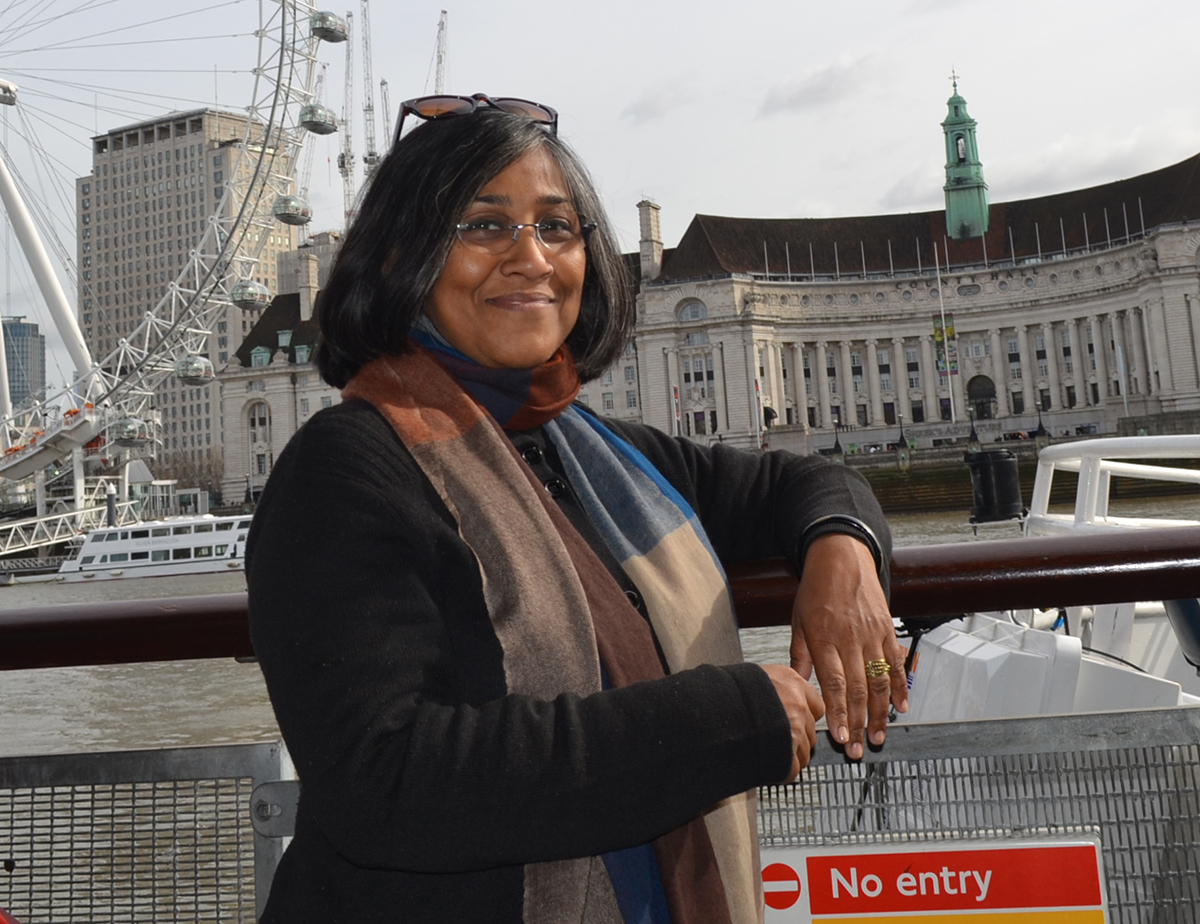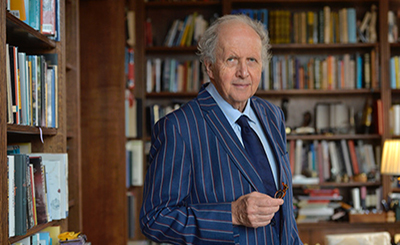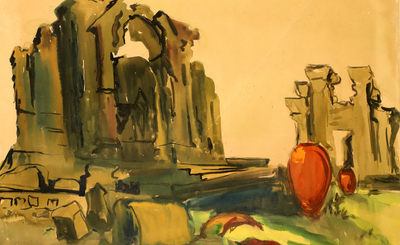
Swati Roy. Photo courtesy of Bookaroo
The 10th edition of Bookaroo wound up in November but the spirit of book love that India’s first children’s festival inspires year after year among children lingers on. Meeting Swati Roy, one of the founders and inimitable driving forces behind it
The tenth edition of Bookaroo wound up in the last week of November 2017, but the spirit of book love that India’s first children’s festival inspires year after year among children lingers on. Swati Roy, one of the founders and inimitable driving forces behind it, along with co-founders Jo Williams and M Venkatesh, has been instrumental in changing the reading landscape for Delhi’s children. They make an indomitable team determined to get children closer to books, stories and book-inspired art and craft. But to understand Roy’s love for children’s books, we need to rewind further back in time to 2003 when she, along with colleague Venkatesh, set up Eureka Bookstore as an independent venture in Delhi’s Alaknanda.
At a time when the city sorely lacked (still does) indie bookshops for children’s books, this was a bold decision that only mavericks with a belief and passion to make the best of the Indian and international books accessible to children can undertake. While Eureka continued to be an indoor cozy nook for books, the thought of making books more accessible to a wider cross-section of the city children began taking shape in their minds. With Jo Williams sharing this same vision, the first edition of Bookaroo was organised in 2008 at the beautiful Anandgram. Since then, the last weekend of every November has morphed into a most bookful and creatively charged time for the city children.
Over the years, the founders have consistently kept expanding the scope of this literature festival both within Delhi and outside. Bookaroo is now an annual fixture in nine cities within India (including Srinagar, Pune, Jaipur and Goa). By launching the Kuching, Malaysia chapter of Bookaroo in 2015, the team made it the only truly international children’s festival in the world. Not surprising, therefore, was it bagging the International Excellence Award in Literary Festivals at this year’s London Book Fair, making it the first and only children’s literary festival in the world to have achieved this distinction.
It’s been far from easy for Roy, Venkatesh and Williams, though. From a constant struggle for financial support year after year, city after city, to frightful last-minute sponsorship and venue cancellations, they have braved it all. And yet, they charge on with their unfailing zeal of bringing children and books together, and of making books alive for them. It also speaks volumes about the deep synergistic strength they and Bookaroo draw from one other.
Bookaroo becomes an exciting annual ritual for children and their parents in every city that the organisers bring into its fold. It offers an eclectic bouquet of activities for the children of all ages, all carefully planned and executed with gusto to foster a love for words, stories and illustrations. All the sessions are interactive, encouraging the children to participate with enthusiasm. This time at the Delhi festival, Bookaroo brought together over 60 speakers — a merry bunch of Indian and international award-winning authors, illustrators, poets and story tellers. Each event exuded, as always, an unmistakable celebration of books in some form. And that remains the festival’s most defining raison d’etre, year upon year. In an age when it is next to impossible for parents to keep their children away from gadgets, Bookaroo continues to get bigger, livelier and more vibrant. In this interview, Roy talks about the making of this book-jamboree.
Richa Jha: What is the first thought that comes to your mind on the morning of any Bookaroo event? And the first at the end of each?
Swati Roy: In the morning, it is trepidation and nervousness — did we forget something? At the end of the first day, there is a sense of relief. A ritual at the end of the first day is also a rapid check of all the things for the next day — this comprises taking feedback from volunteers and subtly finding out from speakers if anything did not work that day. And finally, at the end of the second day, it is a feeling of satisfaction. Nothing else.
Richa Jha: What was going through your mind while receiving the International Excellence Award in Literary Festivals at the London Book Fair earlier this year?
Swati Roy: To be honest, the mind was a total blank at the moment of receiving the award as we were not expecting it. Later as it sunk in, the feeling was that of a validation and affirmation of our efforts over all these years.
Richa Jha: Between Jo, Venkatesh and you, how do you divide responsibilities for Bookaroo?
Swati Roy: Though all three of us know each person’s jobs, broadly, Jo and I handle programming. I handle Bookaroo in the City (the outreach arm) additionally. Venkatesh handles sponsorships, partnerships and media relations.
Richa Jha: How has the Bookaroo journey over the last decade shaped you into what you are today?
Swati Roy: It has given me more confidence and made me more sensitive to children’s choices.
Richa Jha: If you were to rewind to 2008, is there anything you would do differently with Bookaroo?
Swati Roy: Not a thing.
Richa Jha: Over the years, Bookaroo has continued to be as inclusive and wide-reaching as it can get by making it accessible to children from all backgrounds and needs. However, as someone who has been visiting it every year, I have noticed that some of the parents are not too comfortable with this being a free mingling space. Where do you think we, as a society, are going wrong?
Swati Roy: There is a saying — the more things change, the more they remain the same. Perhaps this is why despite the changes that are espoused some things remain the same. However, as an organizer, we have always kept the event inclusive. In this endeavour, we have been supported by speakers, publishers and arts councils. So, in Bookaroo, one can expect to see more acceptance and ease of interaction in the event. Our task is made easier by the fact that children, in any case, are oblivious to differences.
Richa Jha: The children’s literary urban landscape seems to have changed over this past decade, thanks in a big way also to the pioneering foundations laid by Bookaroo. There are now several events similar in essence that happen on a regular basis in different parts of our cities. Why do you think the appeal of Bookaroo remains unfading?
Swati Roy: We are very happy that there are so many events. The more the events the greater the awareness about all the good work that is happening in the field of children’s books. As for Bookaroo, we are constantly innovating, listening to the child, being aware that every child has a different need, and keeping ourselves abreast of developments in the world of children’s literature. We combine all these to curate a programme that has novelty and appeals to a wide range of children.
Richa Jha: I know you have as astounding memory. What tends to stay on more deeply etched in your mind — the happy, pleasant things or the unsavoury ones?
Swati Roy: Always the happy ones. We believe that if there are more happy memories, the not-so-happy can be converted more easily. Having said that, thanks to the sharp memory, one uses each of those unsavoury memories as a learning to make our processes better.
Richa Jha: Any funny memories?
Swati Roy: There are times when I am asked by parents to connect them with the participating speakers, especially the international ones, so that they can take photographs with them. As I get ready to pose, I am made to click those photographs instead! And this has happened not just once!
Richa Jha: In your experience, who are some of the Indian and international children’s writers or illustrators who are ever popular with the children who frequent Bookaroo?
Swati Roy: We do not like to choose one over another. All are special as each is invested in the idea of children’s literature in their own way.
Richa Jha: Some of the speakers who have been participating in the fair regularly and have in some way helped shape the festival’s character?
Swati Roy: Actually each one who has ever participated has shaped Bookaroo. Bookaroo is like an ever-growing rainbow. Each speaker adds a colour to this spectrum. And you never know which colour is which child’s favourite one.
Richa Jha: Are some activities more popular with the children than the others?
Swati Roy: As I said above, each child is different and there is a book for each one. It is up to us to connect them to it. Sometimes, they do it through comics, sometimes art (which again could be caricature, traditional Indian art forms, water colours), sometimes through oral storytelling, sometimes through poetry, sometimes through craft. Therefore, we cannot attach any weightage to any of the sessions. Our job is to offer an array and let the child choose.
Richa Jha: What is it like from a financial point of view to keep a festival like this going year after year, and at the same time expanding to other cities both within the country and outside? I have heard you talk about the fairy godparents who always appear from somewhere at the last minute and gently help keep it afloat. Tell us more about this.
Swati Roy: Getting funding for a children’s literature festival is very difficult. This is the bottom line. If one does not have the resilience to outlast the rejections, one cannot go on. The hassle is, there are lovers of books and literature but they are not necessarily the ones with money. While we continue our eternal wait for a fairy godmother who loves children’s books and has the wherewithal to support a festival such as ours, we plough through our struggle with fragmented support from the corporate world. That, combined with the support from the publishing industry and the arts councils, has helped Bookaroo reach where it has.
Richa Jha: What are some of those things on your wishlist that you’d love to do if you were to get more support?
Swati Roy: I would love to have a more robust Bookaroo in the City (BiC). BiC is our outreach programme where we take speakers into schools, hospitals, orphanages, care homes, special needs centres and remedial homes. While the need is indisputable, there are no takers to sponsor this. Our wishlist includes a wide variety of programmes delivered through various modes and vehicles. The second big wish is to set up a permanent children’s centre.
Richa Jha: Amen to both! Tell us about Bookaroo’s overseas journey? How is it different from the editions in India?
Swati Roy: Children are universal and the hunger for stories remains the same. There is really no difference. The only thing that comes to mind is the different languages we have to take into consideration in our programme when we travel. In any case, one of the things Bookaroo aims to do is to make cross-cultural connections.
Richa Jha: Any plans to expand the festival’s bandwidth?
Swati Roy: Yes, there are a few ideas we want to pursue in 2018. Inshaallah, with the help from the fairy godmother!
Richa Jha: Venkatesh and you have made a concerted effort to revive the library culture in the city. Tell us something about the bottlenecks or the successes.
Swati Roy: There is a need; definitely. While libraries are shutting in other parts of the world, in India the culture never took off very vigorously. So, having entered the arena at a late stage, the new-age library in any city should now serve as a community hub. Yes, as a reading room and a circulating library, most certainly, but also be a social space for children, young adults to hang out and have events — some spontaneous, some curated. Our dream space is one which is created by local communities — with children’s input — be it donated books, art, talks. This is the wish list that we are working on but there are several bottlenecks. Taking cognizance of the need and curating/populating is only part of the setting up of a library; maintaining and marketing (popularising) is a very important component of a successful library movement. This requires funding and intent which are the basic bottlenecks that we face.
Richa Jha: Eureka Bookstore, the much-loved book space for children, is sorely missed in Delhi. If someone keen to open a similar bookstore were to come to you seeking advice, what are you most likely to say?
Swati Roy: It is difficult. Real estate cost is the biggest bane of running a retail space in Delhi. However, if one has a space of their own, then the success depends hugely on location. Say, if the location too is right then the only advice one can give is to keep it as open and welcoming as possible. While the commercial transaction is necessary for a retail space to survive, creating warmth and a welcoming ambience is imperative for a children’s bookstore. That is how one can hear what the child wants.
Richa Jha: What tears you up more at the end of each Bookaroo?
Swati Roy: Wish I had got a few books signed by the participating speakers and taken some pictures with them as memories. I always forget to do that.
Richa Jha: Five words that describe Swati Roy the best.
Swati Roy: Optimist, emotional, workaholic, tenacious, methodical.
Richa Jha: If you were up on a billboard, what would the tagline say? Meet Swati Roy, the …
Swati Roy: Eternal dreamer.
More from The Byword
Comments
*Comments will be moderated











